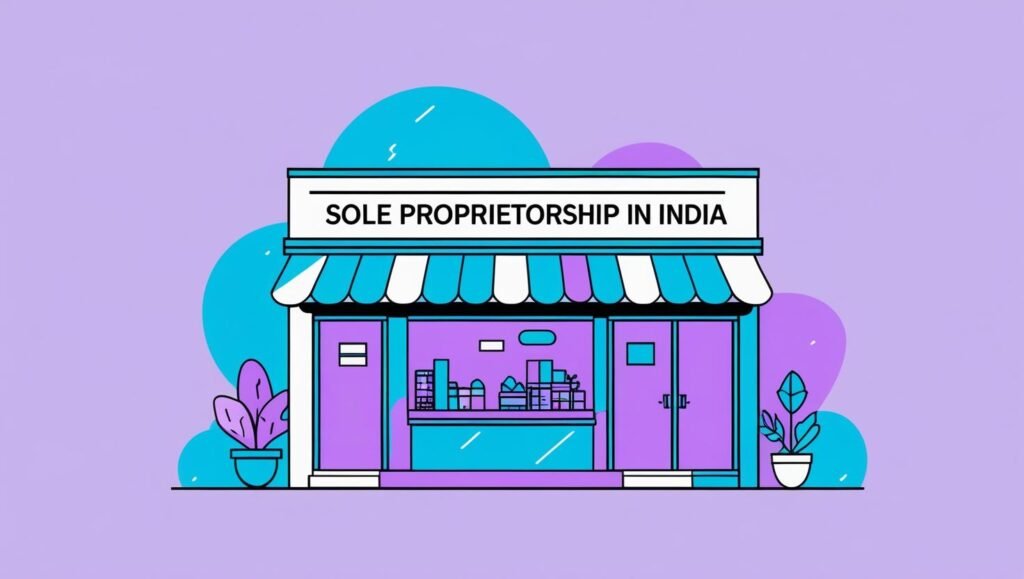What is a Sole Proprietorship?
A sole proprietorship is a business owned and operated by one person, who assumes full control and responsibility for all profits, losses, and liabilities. Common examples include local retail shops, freelance services, consultancy practices, and small-scale manufacturing units. Key characteristics include:
- Single Ownership: The proprietor makes all decisions, from strategy to daily operations, without needing partners or shareholders.
- Unlimited Liability: The owner is personally liable for all business debts, meaning personal assets may be at risk in case of financial distress.
- Minimal Compliance: Unlike companies, sole proprietorships face fewer regulatory requirements, making them cost-effective and easy to manage.
- Flexibility: The business can be started, modified, or dissolved without formal procedures.
Sole proprietorships are ideal for businesses with low capital requirements or those testing a business idea before scaling up.
Importance of Sole Proprietorship Registration
While sole proprietorships do not require formal incorporation, obtaining key registrations enhances legitimacy and operational efficiency:
- Legal Recognition: Registrations like GST or MSME provide proof of business existence, essential for opening bank accounts, securing loans, or signing contracts.
- Access to Government Schemes: MSME registration unlocks benefits like low-interest loans, subsidies, and priority sector lending under schemes like Mudra Yojana.
- Tax Compliance: GST registration ensures adherence to tax laws, enabling input tax credit and avoiding penalties.
- Market Credibility: A registered business instills confidence in customers, suppliers, and financial institutions, enhancing trust.
- E-Commerce Opportunities: GST registration is mandatory for selling on platforms like Amazon, Flipkart, or Meesho, opening access to millions of customers.
- Scalability: Registrations lay the groundwork for future growth, such as expanding to interstate markets or exporting goods.
Without these registrations, sole proprietors may face challenges in accessing markets, securing funding, or proving business legitimacy.
Types of Registrations for Sole Proprietorship
Sole proprietorships gain legal status through the following registrations:
- Permanent Account Number (PAN): The proprietor’s personal PAN is used for all business transactions, as the business and owner are legally indistinguishable.
- GST Registration: Mandatory for businesses with annual turnover exceeding ₹40 lakh (₹20 lakh in special category states), interstate suppliers, or e-commerce sellers. Voluntary registration is also an option for credibility and input tax credit.
- MSME Registration (Udyam Registration): Optional but highly beneficial, this registration under the MSME Development Act, 2006, provides access to government subsidies, credit guarantees, and tax exemptions.
- Shops and Establishment Act License: A state-specific license required for businesses with physical premises, regulating working conditions, wages, and employee rights.
- Other Licenses: Depending on the business type, additional licenses like FSSAI (for food businesses), IEC (for exporters), or trade licenses from municipal authorities may be required.
Each registration serves a specific purpose, from tax compliance to operational legitimacy.
Requirements for Sole Proprietorship Registration
To formalize a sole proprietorship, certain prerequisites must be met:
- Business Name: Choose a unique name that reflects your brand. While not mandatory, a distinctive name enhances marketability.
- Valid PAN: The proprietor’s PAN is essential for tax filings and bank account opening.
- Business Address: A verifiable address (owned or rented) is required for registrations like GST or Shops Act.
- Bank Account: A current account in the business name facilitates transactions and lending.
- Compliance Readiness: Be prepared to file taxes, maintain records, and renew licenses as required.
Benefits of Sole Proprietorship
Sole proprietorships offer unique advantages for small-scale entrepreneurs:
- Low Setup Cost: Minimal investment and no incorporation fees make it accessible for startups.
- Full Control: The proprietor enjoys complete decision-making authority, enabling quick and flexible responses to market changes.
- Simplified Taxation: Business income is taxed as personal income, often at lower rates than corporate taxes.
- Ease of Dissolution: Closing the business requires no formal process, unlike companies or LLPs.
- Access to Incentives: MSME registration provides benefits like collateral-free loans, tax exemptions, and technology upgradation support.
Challenges in Sole Proprietorship
Despite its simplicity, sole proprietorships face challenges:
- Unlimited Liability: Personal assets are at risk if the business incurs debts. Proprietors can mitigate this by maintaining separate business accounts and purchasing insurance.
- Limited Funding: Banks and investors may hesitate to fund sole proprietorships due to their informal structure. MSME registration can improve loan eligibility.
- Compliance Burden: GST and tax filings require diligence. Non-compliance can lead to penalties or loss of input tax credit.
- Scalability Constraints: Sole proprietorships may struggle to scale due to limited resources. Converting to an LLP or company can address this.
- Market Perception: Some customers or partners may perceive unregistered businesses as less professional.
Compliance and Maintenance
Sole proprietors must adhere to:
- Income Tax Returns (ITR): File annually using the proprietor’s PAN, reporting business income.
- GST Returns: Monthly, quarterly, or annual filings (e.g., GSTR-1, GSTR-3B) for GST-registered businesses.
- TDS Compliance: Deduct and file TDS if the business is liable for tax audit (turnover above ₹1 crore for goods or ₹50 lakh for services).
- License Renewals: Renew Shops Act or other licenses as per state regulations.
Non-compliance can result in penalties, loss of benefits, or legal issues.
Conclusion
A sole proprietorship is an excellent starting point for entrepreneurs seeking simplicity and flexibility. By obtaining key registrations like GST, MSME, and Shops Act licenses, you can formalize your business, access government benefits, and build credibility. For hassle-free sole proprietorship registration and compliance, Filingg.com offers expert services to ensure your business thrives. For more details, contact 7791910007 or info@filingg.com today!
